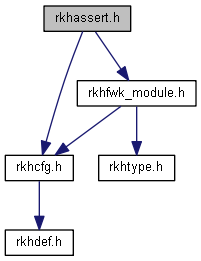|
RKH
|
|
RKH
|
Specifies the assertion macros. More...

Go to the source code of this file.
Macros | |
| #define | RKH_ASSERT(exp) |
| The RKH_ASSERT() macro is used to check expressions that ought to be true as long as the program is running correctly. More... | |
| #define | RKH_ALLEGE(exp) RKH_ASSERT(exp) |
| General purpose assertion that ALWAYS evaluates the exp argument and calls the RKH_ASSERT() macro if the exp evaluates to FALSE. More... | |
| #define | RKH_ERROR() rkh_assert(m_name, __LINE__) |
| Assertion that always calls the rkh_assert() callback if ever executed. More... | |
| #define | RKH_REQUIRE(exp) RKH_ASSERT(exp) |
| This macro checks the precondition. More... | |
| #define | RKH_ENSURE(exp) RKH_ASSERT(exp) |
| This macro checks the postcondition. More... | |
| #define | RKH_INVARIANT(exp) RKH_ASSERT(exp) |
| This macro is used to check a loop invariant. More... | |
Functions | |
| void | rkh_assert (const char *const file, int line) |
| Callback invoked in case the condition passed to RKH_ASSERT(), RKH_REQUIRE(), RKH_ENSURE(), RKH_ERROR(), or RKH_ALLEGE() evaluates to FALSE. More... | |
Specifies the assertion macros.
The assertions (RKH_ASSERT() macro) are used to check expressions that ought to be true as long as the program is running correctly. It is a convenient way to insert sanity checks.
A number of philosophies can be employed when deciding where to use an RKH_ASSERT() macro. Broadly speaking, the assertions only serve the purposes of catching bugs and helping documentation. Helping to document the code means that the statements inside the assertion tell the reader something he might not already know.
Definition in file rkhassert.h.